|
References to Joel and Diana Kelsey in Books
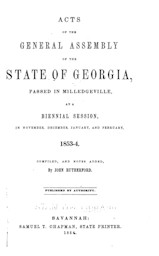
Acts passed by the General Assembly of Georgia
|
Page 279
Sec. XXXILL - And be it further enacted by the authority aforesaid, That John Glenn, Oswell Houston, Julius A. Hayam, James Davis, Joel Kelsey, George Robinson and William Markhan, shall be and are hereby declared to be a body corporate, by the name and style of the Trustees of the first Presbyterian Church of Atlanta, it is being the only Presbyterian Church now in said city, and they and their successors in office, shall be invested with all manner of property which belongs to the said Church, by deed or otherwise, or which may hereafter be acquired by gift, grant or purchase, made to them or transferred to them, the said Trustees and their successors to have and to hold the same for the proper use, benefit and behoof of the said First Presbyterian Church of Atlanta; ;and that the said Trustees and their successors in office, are hereby declared to be capable of suing and being sued, of pleading and being impleaded, and of using all necessary means for recovering and defending said property wherever which the said Trustees may hold or claim, for the use of said Church.
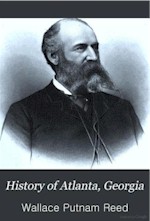
History of Atlanta, Georgia: with illustrations and biographical sketches of some of its prominent men and pioneers.
|
Pages 65 - 66
At the election held in January, 1850, for city officers, W. Buell was elected mayor, and Joel Kelsey, Henry C. Holcombe, J. T. Humphries, P. M. Hodge, S. T. Biggers and B. W. Roark were elected councilmen. At their first meeting after election the bonds of the various officers were fixed as follows : Treasurer, $5,000; tax receiver and collector, $5,000; clerk, $2,000; marshal, $2,000; deputy marshal, $2,000. German M. Lester was elected marshal; John L. Harris, clerk; Oswald Houston, treasurer; and Hugh M. Boyd, tax receiver and collector.
On February 8, 1850, the following resolution was adopted: That each and every person, at the time of taking out his license, shall give bond in the sum of $200, with two good and sufficient securities, that he will not knowingly violate or permit any State law or by-law of the city of Atlanta to be violated within his retail house, or on the premises thereof, without giving notice thereof to the corporate authorities of said city within twenty-four hours thereafter, and that the giving of said notice shall avoid the forfeiture. On the 16th of the month the council decided to have sidewalks constructed on each street, eight feet wide, and that owners of lots might plant ornamental trees along such sidewalks. The council then determined to have the proceedings of the council published, provided such publication could be had gratuitously. The editor of the Intelligencer accepted the publication of the proceedings of the council on these conditions, for which he received the thanks of the council. March 9th the committee on graveyard reported that Messrs. Cone and Williamson offered to give the council one acre of land and to sell them four acres more at one hundred dollars per acre. The proposition was accepted, but immediately reconsidered and the committee discharged. A new committee was then appo'nted, consisting of Messrs. Hodge and Roark.
The next important subject to engage the attention of the council was the agricultural fair. This was discussed on the 1 ith of March. A committee of six was appointed to solicit subscriptions to the lists which Messrs. Jones and Hayden had sent in. This committee consisted of Luckie, Thompson, Hodge, Hayden, Ezzard and Bomar. By the 5th of April the subscription had been sufficiently increased to warrant the statement that the desired sum, $1,000, could be collected, and that that amount could safely be guaranteed to the locating committee of the Southern Agricultural Association; this being the amount required by this association in order to secure the location of their fair at Atlanta. In order further to assist this association, and to make the fairs, which it proposed to hold annually, a permanent attraction at Atlanta, the council, on the 10th of April, passed a resolution that a conveyance to the lot containing ten acres, more or less, particularly described in a bond for title from Lemuel P. Grant to Augustus S. Rhodes, and known as the ho-pital lot of the city of Atlanta, be executed to the Southern Agricultural Association, to have and to hold said lot so long as the said association should continue to hold their annual meetings in the city of Atlanta, with a clause in said deed authorizing the officers of said association to permit the city of Atlanta to use said lot and buildings for other public meetings so long as the citizens shall not abuse said property or privilege ; said property, with the buildings thereon, to revert to the mayor and council of Atlanta, when said Southern Agricultural Association should cease to use annually the lot and buildings for the purposes designated in said deed of conveyance.
This proposition did not suit the Southern Agricultural Association, and as a consequence the terms of the donation were modified. On December IO, 1850, a communication was received from the Hon. Mark A. Cooper, chairman of the committee of the association with reference to the matter of the fair grounds, which was answered by Jonathan Norcross, mayor of Atlanta, on April I, 185 1. The substance of the communication of Mayor Norcross was to the effect that the mayor and council of Atlanta had, on April 10, 1850, proposed to deed to the Southern Agricultural Association the hospital lot, containing ten acres of land, upon which the association should have the privilege of holding its fairs, upon the condition that the corporate authorities of the city of Atlanta should have the privilege of opening the grounds for the reception of other public gatherings when the grounds were not in use by the association. These conditions were rejected by the association's committee of location, and the city authorities subsequently made a deed to the association with the condition only that the land, with the buildings and appurtenances thereon, should revert to the city when the annual fair of the association should cease to be held thereon. Thus the city authorities were excluded from the grounds, except in times of the fair, and then they had to pay an entrance fee in the same manner that other people had to pay to gain entrance to the grounds. This condition, taking into consideration the guarantee of $1,000 which the city had made good, was considered rather severe upon the city authorities, and was the cause of much dissatisfaction. Besides this there seemed to be some difference of opinion between the association and the mayor and the city council as to the guarantee fund itself. Mr. Norcross was of the opinion that the city had performed its part of the contract by the payment of $750, the Georgia Railroad Company having paid $250, which payments together made up the $1,000 guaranteed. That the $250 paid by the Georgia Railroad Company was intended to be included in the guarantee was certified to by W. W. Roark, Joel Kelsey and Stephen T. Biggers of the council, and by Henry C. Holcombe and the mayor, W. Buell, on February 28, 1851. Thus the matter rested for a considerable time.
The committee on the graveyard reported, May 3, 1850, that they had not purchased a lot within the city limits, but that a suitable lot could be purchased outside the city. The committee was thereupon discharged, and it was resolved that the mayor and the members of the council would go in committee of the whole to visit lots suggested as suitable for a graveyard, and also
Page 450:
The First Presbyterian Church was organized January 8, 1848, by the Rev. John S. Wilson, D.D., in the little log building known as the male academy, standing at the junction of Peachtree and Pryor streets, which was used by all denominations for a church at that time. Following are the names of those signing the agreement to be members of this church, which was named by them " the Presbyterian Church of Atlanta:" Joel Kelsey, Minerva Kelsey, Kesiah Boyd, Margaret Boyd, Oswald Houston, Annie L. Houston, Jane Gill, Mary A. Thompson, C. J. Caldwell, Mary J. Thompson, Joseph Thompson, Henry Brockman, Ruth A. Brockman, James Davis, Jane Davis, H. A. Fraser, Julia M. L. Fraser, Lucinda Cone and Harriet Norcross.
The first three ruling elders were Joel Kelsey. Oswald Houston and James ' Davis. The following trustees were appointed January 28, 1850: John Glenn, G. T. McGinley, Oswald Houston, J. A. Hayden, James Davis, Reuben Cone and Joseph Pitts.
A lot was purchased on Marietta street for $300 from Reuben Cone, upon which a brick church edifice was erected during the years 1850, 1851 and 1852, ' at a cost of about $4,200. It was 70 x 40 feet in size, and had a basement for Sunday-school. purposes. Over the vestibule was a gallery for organ and choir. The building was surmounted only by a small belfry in which no bell was ever placed. The church was dedicated July 4, 1852. This church was incorporated in February, 1854, John Glenn, Oswald Houston, JuliusA. Hayden, James Davis, Joel Kelsey, George Robinson and William Markham being the incorporators. The name under which it was incorporated was the " First Presbyterian Church of Atlanta," and it was then the only Presbyterian Church in the city. Rev. John S. Wilson was stated supply from January 1, 1848, for nearly five years. He was followed by Rev. J. L. King, who was stated supply about ten months. Rev. J. E. DuBois was stated supply during 1854, at the end of which time he was installed pastor and remained with the church-' about three years.
Page 291:
(this is a reference to Joel Kelsey Jr)
In 1871 fire companies Nos. 1, 2 and 3 had steam engines, and companies 4 and 5 had hand engines. At this time the fire department was well organized- and was in an efficient and serviceable condition. Following is a list of the officers of the department from 1871 to the organization of the paid service: 1871, John Berkele, chief; George Wallace, first assistant; Joel Kelsey, second assistant; B. F. Moore, secretary; B. B Crew, treasurer. 1872, W. R Biggers, chief; W. D. Luckie, first assistant; D. B. Loveman, second assistant; B. F Moore, secretary; B. B. Crew, treasurer. 1873, Jacob Emmel, chief; James E. Gullatt, first assistant; Frank Doonan, second assistant; James E. Mann, secretary; B. B. Crew, treasurer. 1874, W. R. Biggers, chief; A. Boos, first assistant; M. R. Berry, second assistant; J. H. Sterchi, secretary; B. B. Crew, treasurer. 1875, Jacob Emmel, chief; E. M. Berry, first assistant; Jerry Lynch, second assistant; James E. Mann, secretary ; . . .
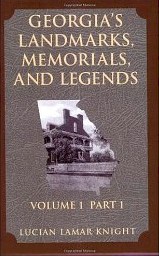
Georgia's Landmarks, Memorials, and Legends
|
Pages 571 & 573
Pioneer Residents. In the following carefully prepared list will be found the names of some of the most prominent residents of Atlanta prior to the Civil War:
. . .
Kelsey, Joel
Kelsey, Wm.
. . .
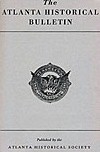
Atlanta Historical Bulletin 1971
|
Volume 16
Several pioneer and useful citizens of the Atlanta area died during 1867. . . . Joel Kelsey, Sr., age 73, native of New Milford, Connecticut, and one of the original settlers of Atlanta, died October 22nd while visiting a daughter in Jefferson, Texas. He was the first bookkeeper for the Georgia Railroad in Atlanta and was also one of the three original ruling elders of the First Presbyterian Church in 1848.

Pioneer citizens' history of Atlanta, 1833-1902
|
Page 33:
LIST OF RESIDENTS IN 1851.
. . .
Joel Kelsey, carbuilder Georgia Railroad
. . .
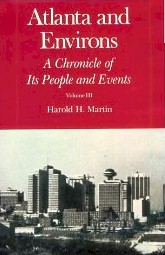
Atlanta and Environs, Vol. 1
|
Page 250:
First officers and charter members of Atlanta Lodge No. 59 were: . . . Joel Kelsey, . . .
Page 270:
On January 8, 1848, as Dr. White was preparing to depart for Athens, nineteen Presbyterians banded themselves together and agreed to unite in the organization of a church, to be known as "The Presbyterian Church of Atlanta." The agreement was adopted and subscribed to on that date by Joel Kelsey . . .
Page 271:
The first three Ruling Elders were Joel Kelsey, Oswald Houston and James Davis, to whom A. F. Luckie was shortly added.
Page 309:
The City of Atlanta, too, acquired a new slate of offiers in January, 1850. Magistrate Willis Buell of the 1026th Militia Districk was elected Mayor and functioned in a dual capacity during the year. Councilmen elected to server with him were John Kelsey, . . .
Page 768:
Other less spectacular departures from the land of the living during 1867 included. . . . Joel Kelsey, Sr., age 73, native of New Milford, Connecticut, and one of the original settlers of Atlanta, died October 22nd while visiting a daughter in Jefferson, Texas. He was the first bookkeeper for the Georgia Railroad in Atlanta and was also one of the three original ruling elders of the First Presbyterian Church in 1848.
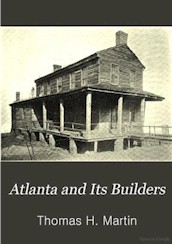
Atlanta and its builders: a comprehensive history of the Gate city
|
Page 57:
"On Monday, in company with Jim and Johnnie Loyd and Joel Kelsey, I (George G. Smith) set out to explore the new town. It seemed to me immense. It was set down in the woods, and houses of many shapes and sizes were among the trees. There was Slabtown, straggling down toward Decatur. There was a right busy center where Peachtree, Marietta and Decatur streets join, where Jonathan Norcross had his store, and where George W. Collier had his post-office, and nearby Moses Formwalt had his two shops and Clark Powell and Tom Kile their well-patronized grog-shops. Old Daniel Dougherty, a genial, warm-hearted Irishman, had a bakery where the railroad crosses Whitehall street. Where the viaduct is there were no houses, but beginning at Alabama street there was an almost unbroken line of wooden stores to Mitchell. A line of small shops and stores was on the north side of Decatur street down to Loyd. The work shops of the railroads were near what is now the union depot. The three railroad depots were close together, the Georgia where it now is, the Macon and Western west of the present station, and the Western and Atlantic depot on what is now the Brown block. There was but one brick house in the town—the Atlanta Hotel.
Page 94:
The city administration of 1849 was not regarded as bad, so much as weak. Good men composed it—men prominent the next year in the work of cleaning out the dives. It required a man with the boldness and rigid morality of Jonathan Norcross to give the reform movement the necessary official backbone. The mayor who preceded Mr. Xorcross and succeeded Mayor Formwalt was Benjamin F. Bomar, and the members of the council of 1849 were Jonas J. Smith, Ira O. McDaniel. P. M. Hodge, A. B. Forsyth, H. C. Holcombe and J. A. Hayden. The mayor who succeeded Mayor Bomar in 1850 was W. Buell, and the council over which he presided was composed of H. C. Holcombe, Joel Kelsey, P. M. Hodge, J. T. Humphries, S. T. Biggers and B. W. Roark. Before continuing the narrative of Atlanta's progress in the early fifties, it will be well to take some note of the routine municipal happenings of 1849 and 1850.
Page 98:
. . . Thus the city authorities were excluded from the grounds, except in times of the fair, and then they had to pay an entrance fee in the same manner that other people had to pay to gain entrance to the grounds. This condition, taking into consideration the guarantee of $1,000 which the city had made good, was considered rather severe upon the city authorities, and was the cause of much dissatisfaction. Besides this, there seemed to be some difference of opinion between the association and the mayor and the city council as to the guarantee fund itself. Mayor Norcross was of the opinion that the city had performed its part of the contract by the payment of $750, the Georgia Railroad Company having paid $250, which payments together made up the $1,000 guaranteed. That the $250 paid by the Georgia Railroad Company was intended to be included in the guarantee, was certified to by W. W. Roark, Joel Kelsey and Stephen T. Biggers, of the council, and by Henry C. Holcombe and the mayor. W. Buell, on February 28th, 1851. Thus the matter rested for a considerable time."

Families of Early Milford, Connecticut
|
Page 451:
14. Daniel Miles son of John and Martha (Smith) was born 11 October 1747 and died 1808 (BP) 12 September 1808 ae 61 (private). He married Mary Mallett who died 1 November 1799 dau of Lewis and Mary (Merwin).
Children:
Daniel b 1778
Polly died 1782
Betsey b 26 Apr 1780 died 4 Nov 1860 (TSM) mar 14 Sept 1800 Capt. Isaac Treat b 30 Nov 1780 died 11 Mar 1844 (TSM) son of Phill & Sarah (Atwater)
Jared b 1782
Polly mar 3 Sept 1806 Reuben Whitehead
Eunice mar (___) Smith. Removed to Atlanta, Ga.
Diane b 1795 mar 16 Sept 1818 Joel Kelsey. Removed to Ga.
|







